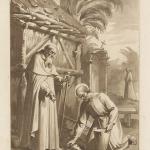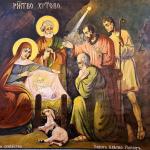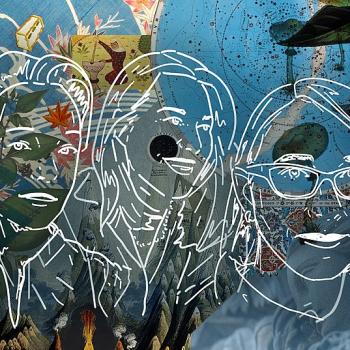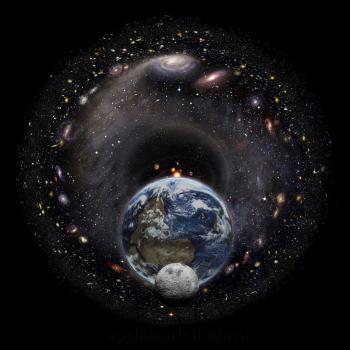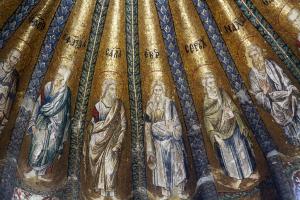
Before Christmas, the Byzantine tradition has us reflect upon all the holy men and women who came before Christ and consider how their lives helped shape the context in which Jesus, the incarnate God-man, was born. Likewise, it would have us look to his family line, to see how, throughout it, we find men and women whose engagement with God led to all kinds of graces being shared into the world, graces which were also accumulated in the family line so that it could and would lead to Mary, the Mother of God. We are also shown that the perfection of humanity is a communal perfection: no one can attain perfection apart from the shared destiny of humanity. Those who came before Christ, just as those who came after him, need each other to realize their perfection in Christ. Similarly, it also shows us without the special grace of God given to humanity, grace which was given to it in and through the incarnation, humanity could not attain its proper end.
The drama of human history shows us that humanity has been given a space in which to act, a space which gives them freedom, the freedom to decide for themselves who they want to be. It was given to them, and so it, in itself, is a part of the order of grace, for it is only in and through such grace that creaturely freedom can be sustained. This is why salvation, which is given to us by God, is not something which imposes itself upon us and forces us to be a certain way; rather, God gives us room to respond, to decide if we will cooperate with salvific grace or not.
The faith of the forefathers and foremothers show us we must work for and promote what is best. They trusted in God, even when it seemed their hopes would not be fulfilled and they would not see the promises gave fulfilled in their lifetimes. “And all these, though well attested by their faith, did not receive what was promised, since God had foreseen something better for us, that apart from us they should not be made perfect” (Heb. 11:39-40). Their lives, lived well, helped pave the way for something better, indeed, far more wondrous than they could have imagined: God became man, God became one of us, and took on and shouldered our burdens with us.
Perfection is not individualistic. Every person has their story, their place in history. No one exists independently from everyone else. Even the good someone attains comes reveals the way they are connected to others. We need each other. Sin likes to divide up and destroy the world. As long as we accept such division, we accept the way of sin and so cannot and will not attain perfection. We find the truth of this represented in the family line of Jesus. God chose a family to receive special graces, and through those graces, that family did not only work for themselves and their own pleasures, but for the benefit of those around them, allowing the grace they had been given to grow in the sharing of it, until, at last, the Virgin Mary was born, and the time was right for the incarnation. This is why Scripture presents to us the family line of Jesus, however legendary it might be, for it is meant to point out that Christ truly has a connection with the rest of humanity (cf. Matt. 1:1-17).
Everyone, not just those in Jesus’ family line, will find themselves tested, in one fashion or another, so as to prove their fidelity to God and God’s grace, which is why we are shown the way many who came before us passed their tests:
By faith Abraham, when he was tested, offered up Isaac, and he who had received the promises was ready to offer up his only son, of whom it was said, “Through Isaac shall your descendants be named.” He considered that God was able to raise men even from the dead; hence he did receive him back, and this was a symbol. By faith Isaac invoked future blessings on Jacob and Esau. By faith Jacob, when dying, blessed each of the sons of Joseph, bowing in worship over the head of his staff. By faith Joseph, at the end of his life, made mention of the exodus of the Israelites and gave directions concerning his burial (Heb. 11:17-22 RSV).
Mary and Joseph, likewise, had their own tests: Mary, when she was greeted by the Archangel Gabriel, and Joseph, when he found out by Gabriel that Mary was pregnant, had to determine how they would react to the news, whether or not they would welcome it. Both felt it to be a challenge, as they did not know how it could be, but once they accepted it, they accepted their special role in salvation history. Mary showed herself ready to be the Mother of God, while Joseph showed himself fit to be Jesus’ guardian and protector.:
Now the birth of Jesus Christ took place in this way. When his mother Mary had been betrothed to Joseph, before they came together she was found to be with child of the Holy Spirit; and her husband Joseph, being a just man and unwilling to put her to shame, resolved to send her away quietly. But as he considered this, behold, an angel of the Lord appeared to him in a dream, saying, “Joseph, son of David, do not fear to take Mary your wife, for that which is conceived in her is of the Holy Spirit; she will bear a son, and you shall call his name Jesus, for he will save his people from their sins.” (Matt. 1:18-21 RSV).
We, should truly appreciate the role of all the holy men and women before the coming of Christ into the world, including and especially his ancestors, had in salvation history. Each of them offered something which helped prepare the way for the incarnation. But it is also important to keep in mind is that all they could do is prepare the way; they could not bring humanity or history to its fitting end. They could not bring it to perfection:only God could do that. Christianity, even if it has many myths and legends contained in its Scriptures, remains a religion interested in history. We must not, therefore, ignore history and think it is superfluous. We must not become like the so-called Gnostics who sought a way to deny unity between material existence and God. The world was created good. Its proper good is found in bringing everything together as one. Let us, therefore, find our place in history, serve God, and do so in a way to promote unity and serve, in our own way, the work of the incarnation itself.
Stay in touch! Like A Little Bit of Nothing on Facebook.
If you liked what you read, please consider sharing it with your friends and family!
N.B.: While I read comments to moderate them, I rarely respond to them. If I don’t respond to your comment directly, don’t assume I am unthankful for it. I appreciate it. But I want readers to feel free to ask questions, and hopefully, dialogue with each other. I have shared what I wanted to say, though some responses will get a brief reply by me, or, if I find it interesting and something I can engage fully, as the foundation for another post. I have had many posts inspired or improved upon thanks to my readers.


